| About MEPLA |
| |
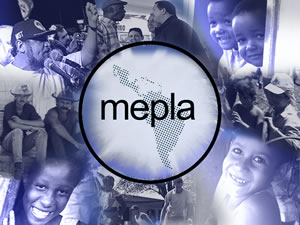 MEPLA is a research centre based in Cuba. MEPLA is a research centre based in Cuba.
It is a non-profit institution independent of all governmental or party agencies, founded in 1991 and registered in the Special Notarial Office of the Ministry of Justice under file No. 707/91.
It aims to contribute to the recovery of the historical memory of the Latin American popular movement, to consideration of its experiences and to wide distribution of information about these experiences.
The originality of MEPLA is that through its publications it brings to the reader the actual voices and images of historical actors.
Its fundamental aim is to be a bridge for the exchange of experiences and a useful instrument of popular education, facilitating contact between people who are following similar paths and who feel the urge to transform reality and to make small silent revolutions using the same raw material used by all of us.
This is why its activities are not limited to research but include a commitment to popular education.
MEPLA has many publications about the experience of the Latin American Left, both at the organizational and political level and in the administration of local government, about popular movements and community activities, including several Cuban community experiences, with corresponding documentary films.
OUR ACTIVITIES
- Collection and classification of experiences by means of interviews and discussions with the main protagonists or representatives of different social movements, local governments, community projects or political tendencies.
- Analysis and theoretical elaboration of key themes and issues raised in the process of gathering information about specific historical experiences.
- Preparation of political chronologies of the countries under consideration so as to enable the reader to situate these experiences in their historical context.
- Circulation of the results, either directly as written or visual testimony or in the form of articles, with the express purpose of contributing to the theoretical debate and to the search for alternatives so as to reinforce the social movement in each country.
- The preparation of documents and videos with the conclusions derived from these experiences.
- A computerized index of the bibliographical material relating to these themes.
- Organization of workshops, meetings and seminars to promote mutual benefit through the direct exchange of experiences between activists.
- Collaboration with similar institutions in Cuba or abroad, in order to facilitate exchange and coordination of efforts in order to achieve better results.
- Participation in national and international events related to our mission.
PUBLICATION AND VIDEOS
- On the parties of the Left in Latin America: The Workers' Party of Brazil, the Broad Front of Uruguay.
- On popular participation in Latin America: the municipal governments of the PT in Brazil, in Sao Paulo, Porto Alegre, Vitoria, Santos and Diadema, the "Causa R" in Venezuela, in Caracas and Caroni, and of the Uruguayan Broad Front in the City Council of Montevideo. The process of discussion with the population about the municipal budgets.
- On Cuban community experiences: family doctors, work with exprisioners, teachers working in the community and community economic management.
HOW CAN YOU HELP?
- By sending donations to support the development of MEPLA, either in money or equipment: computers, VHS tapes, audio tapes.
- By financing one of our projects, in whole or in part.
- By taking out a supporting subscription of $100, $200 or $300, which entitles you to receive all of the year's publications.
- By financing the publication of our studies.
- By financing the production of our videos.
.
HOW CAN YOU SEND US YOUR CONTRIBUTION?
Contributions should be deposited in account Nº 26216 at the Banco Financiero Internacional in the name of MEPLA, in any hard currency except US dollars. Please notify MEPLA of your contribution by fax.
Banks through which contributions may be sent:
-National Bank of Canada (Montreal)
-Banco Bilbao Vizcaya (in pesetas)
-Banco Exterior de Espa¤a (in pesetas)
-Union de Banques Suisses (Zurich)
-Havana International Bank (London)
-Albert de Bari (Holland)
-Deutsch Sudamerikanisch Bank (Hamburgo, Germany)
-Generale Bank (Brussels, Belgium)
OUR AREAS OF WORK
1. ORAL MEMORY
Recording accounts of different through interviews and workshops with activists.
2. AUDIO VISUAL
Production of videos which record the main aspects of these experiences in an attractive, accessible and educational form.
3. POPULAR EDUCATION
Preparation of documents and videos which present the conclusions derived from our studies in a didactic format.
|
| |
|
| |
Centro de Investigaciones
"Memoria Popular Latinoamericana"
Directora: Marta Harnecker
Address: Calle 13 No 504, entre D y E, Vedado
Plaza, Ciudad de La Habana, Cuba
Telefax: (537) 833-3075
Telephone: (537) 832-2154
[email protected]
|
| |
|
| |
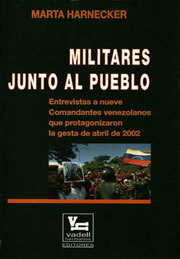 |
|
MILITARY LINKED TO THE PEOPLE |
| |
|
| |
Marta Harnecker, 2003 |
| |
|
| |
Interview to nine Venezuelan commanders who had main roles in Chávez’s return to the Presidency of the Republic, after the in attempted coup failed in April, 11th, 2002.
Published in: Venezuela, Editores Vadell Hermanos, 2003; in Spain by El Viejo Topo, 2003. |
|
|
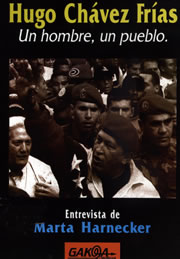 |
|
HUGO CHÁVEZ FRÍAS
One man and his people |
| |
|
| |
Marta Harnecker, 2002 |
| |
|
| |
Interview to Venezuelan president Hugo Chávez, leader of a revolutionary process misinterpreted by international mass media and not well understood by European and Latin American left and progressive sectors. A process that breaks the preconceived frameworks of revolutionary processes. This interview takes place after the coup of April 11th 2002 incorporating information and reflections about how a president was removed by a coup and recovers the government in less than 48 hours.
Published in Spain, Editorial Gakoa; 2002; Venezuela, Editorial Asociación Civil Universitaria por la Equidad, 2002; 2ª ed. 2003 and Editora Talleres Gráficos de Mérida, 2003; Cuba, Editorial de Ciencias Sociales, 2002; Colombia, Ediciones Desde Abajo, 2002; Italia, Edizioni Pettirosso, 2003. |
|
|
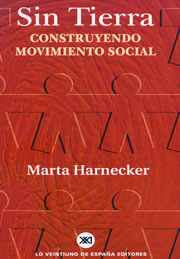 |
|
LANDLESS PEOPLE
Building a social movement |
| |
|
| |
Marta Harnecker, 2002 |
| |
|
| |
Essay about the Landless Rural Workers Movement (MST) from Brazil, 2002.
Published in: Spain, Siglo XXI España. 1st ed., 2002; Brazil, in English, Editora Expressâo Popular, 2003. |
|
|
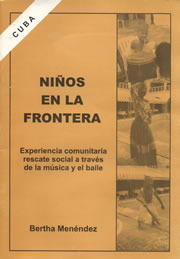 |
|
CHILDREN ON THE FRONTIER |
| |
|
| |
Berta Menéndez, 2002 |
| |
|
| |
Community experience on the Frontier neighborhood in Havana city where kids and adolescents are socially rescued through music and dance.
Published in Cuba, MEPLA, 2002. |
|
|
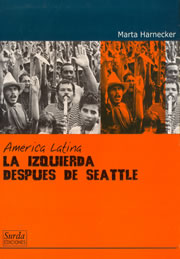 |
|
THE LEFT AFTER SEATTLE |
| |
|
| |
Marta Harnecker, 2001 |
| |
|
| |
Study of eight Latin American experiences of struggle against neoliberalism: Chiapas, FMLN in El Salvador; Bolivarian revolutionary process in Venezuela; the guerrillas in Colombia; Ecuador, the indigenous movement and the Pachakutik; the Workers’ Party (PT) from Brazil and the Landless Movement in that country; the Frente Amplio from Uruguay and reflections about the need to articulate the party left and the social left to establish a significant social bloc against neo liberalism. Finished by the end of 2001. Ready for publication in Portuguese.
Published in: Spain by Siglo XXI Editores de España, 1st ed, 2002; Chile by Ediciones SurDa, 2002; in Venezuela under the title Latin America and the challenges of the left, by Instituto Municipal de Publicaciones de la Alcaldía de Caracas, 2002. |
|
|
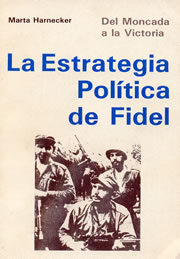 |
|
FIDEL: POLITICAL STRATEGY OF VICTORY |
| |
|
| |
Marta Harnecker, 2001 |
| |
|
| |
Essay on the role Fidel gives to political work and to politics, in general, in his struggle strategy against Batista. It shows the role he gives to propaganda in making people conscious, showing his tactical flexibility not letting aside the principles and the importance of the revolutionary forces. Under the title Fidel’s political strategy: From Moncada to victory, it was published in different Latin American countries in 1985. Published in Cuba in 2001 with a new introduction by Miguel Urbano and an annex: The unique party in Cuba and the matter of national sovereignty.
Printed in Dominican Republic, CEDICITE 1st ed., 1985; Peru, Causachún, 1985, and Horizonte, 1985; El Salvador, Taller Popular FMLN, 1985, Bolivia, MIR-Bolivia Libre, 1986 and Editorial Panamericana, 1985; Argentina, Editorial Contrapunto, 1985; , Panama, Ediciones Bayano, 1986, Peru, Instituto de Investigaciones Cambio y Desarrollo, 1986; Chile, Ediciones Instituto de Ciencias Alejandro Lipschutz, 1986; Uruguay, Editorial Compañero, 1986; Venezuela, Ediciones Centauro, 1986; New York, London, Sydney Editorial Pathfinder Press, 1987; Brazil, Editora Expressão Popular, 2000; in Cuba with the title: Fidel: The political strategy of victory, Editorial de Ciencias Sociales, 2001. |
|
|
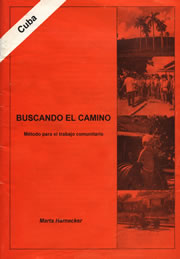 |
|
IN SEARCH OF THE WAY |
| |
|
| |
Marta Harnecker, 2000 |
| |
|
| |
Community work method carried out in the rural community of Guadalupe, Ciego de Ávila province.
Published in Cuba, MEPLA, 2000. |
|
|
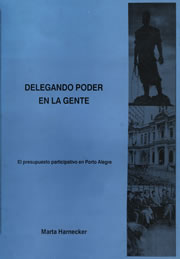 |
|
DELEGATING POWER ON THE PEOPLE
The participatory budget in Porto Alegre, Brazil |
| |
|
| |
Marta Harnecker, 1999 |
| |
|
| |
How the neighbors decide what must be done with the municipality’s available resources.
Published in Cuba, MEPLA, 1999. |
|
|
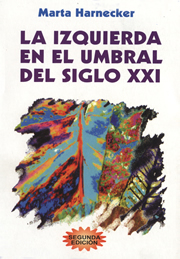 |
|
MAKING THE IMPOSSIBLE POSSIBLE
The Left on the threshold of the XXI Century |
| |
|
| |
Marta Harnecker, 1999 |
| |
|
| |
Its first part approaches a summary of the most outstanding events that happened in Latin America since the triumph of the Cuban revolution until the end of the 20th Century; the second part develops the world changes from that moment on until today: the technological revolution; globalisation; neoliberalism and its consequences to the popular movement and especially for the working class; the third part refers to the left in this new world situation and its challenges.
Published by Siglo XXI Editores in Mexico, 1999; in Spain by Siglo XXI España, 1st ed. 1999, 2nd ed. 2000, 3rd ed. 2000; in Cuba by Editorial Ciencias Sociales, 2000; in Portugal by Campo das Letras, 2000; in Brazil by Paz e Terra, 2000; in Italy by Sperling & Kupfer Editori, 2001; in Canada by Lantôt Éditeur, 2001, and in El Salvador, by Instituto de Ciencias Políticas y Adminstrativas Farabundo Martí, 2001. |
|
|
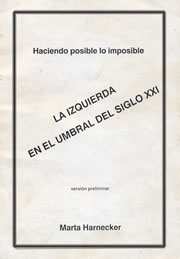 |
|
MAKING THE IMPOSSIBLE POSSIBLE
The Left on the threshold of the XXI Century (preliminary version) |
| |
|
| |
Marta Harnecker, 1998 |
| |
|
| |
A shorter version of the final edition published under the same title.
Published in: Cuba, MEPLA, 1998; Chile, SurDa Ediciones, 1998; Colombia, Editorial Desde Abajo, 1998. |
|
|
 |
|
FORGING THE FUTURE
Education and community |
| |
|
| |
Marta Harnecker, 1997 |
| |
|
| |
Experience of the work developed by a group of teachers from the district “Hermanos Cruz”, in Pinar del Río, where school and community get together to obtain significant results.
Published in Cuba, MEPLA UNICEF, 1997. |
|
|
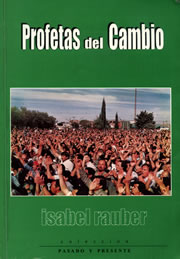 |
|
PROPHETS OF THE CHANGE |
| |
|
| |
Isabel Rauber, 1997 |
| |
|
| |
An experience of power construction in Argentina.
Through individual interviews, it starts from the history of Argentinean unionism and basically summarizes the theoretical and practical proposals of an Argentinean working sector, about the construction of a new power of workers and the people. |
|
|
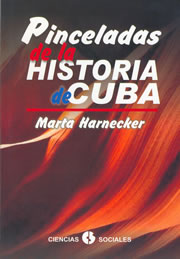 |
|
BRUSHSTROKES OF THE CUBAN HISTORY
Testimony from 19 grandparents |
| |
|
| |
Marta Harnecker, 1997 |
| |
|
| |
Testimony of a group of senior citizens from Santa Fe, an area in Havana city who tell, through short stories, about their way of living before the revolution, and how it changed with it. In the second part, they talk about life within the seniors association they belong to.
Published in Spain: Universidad Politécnica de Valencia, Valencia, 1999, using the same versión presented to the Casa de las América contest in 199. A preliminary versión, with only 12 testimonies was published in Cuba with the title Blossoming in the winter, Ediciones MEPLA, 1996. |
|
|
 |
|
BLOSSOMING IN THE WINTER
Senior citizens from Santa Fe |
| |
|
| |
Marta Harnecker, 1996 |
| |
|
| |
Testimony from a group of elderly people from Santa Fe, Havana, who tell through brief real life stories how their life was before the revolution and how it changed afterwards. In the second part they refer to their life as part of the senior association they belong to.
Published in Cuba, MEPLA, 1996. |
|
|
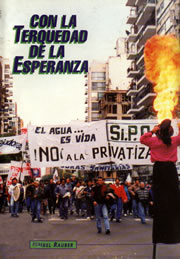 |
|
WITH THE HOPE OBSTINACY |
| |
|
| |
Isabel Rauber , 1996 |
| |
|
| |
Reflections about the experience of the trade union of the personal of sanitary works in Córdoba, Argentina.
A rich experience to think over a life stage, its problems, protagonists, and learn from it. |
|
|
 |
|
EL CONDADO
Building houses and transforming men |
| |
|
| |
Marta Harnecker, 1996 |
| |
|
| |
Study of a community experience in a neighborhood from Santa Clara in the province of Villa Clara.
Published in Cuba, MEPLA ACEI, 1996. |
|
|
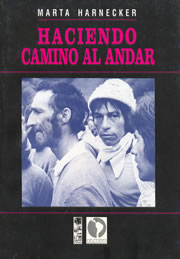 |
|
MAKING THE ROUTE ON WALKING |
| |
|
| |
Marta Harnecker, 1995 |
| |
|
| |
Study of eight local goverments with popular participation: Five PT mayoralties in Brazil: Säo Paulo, Porto Alegre, Vitoria, Santos and Diadema ruled by the PT in Brazil; Caracas and Caroní ruled by Causa R in Venezuela and Montevideo Intendancy, by Frente Amplio in Uruguay.
Published in: Chile, LOM Ediciones, 1st and 2nd ed., 1995 and in Brazil, Thesaurus, 1996. |
|
|
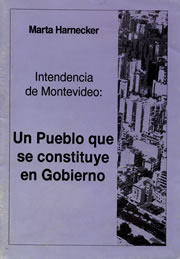 |
|
A TOWN THAT BECOMES A GOVERMENT |
| |
|
| |
Marta Harnecker, 1995 |
| |
|
| |
Study of Montevideo intendancy from Frente Amplio from Uruguay.
Published in Cuba, MEPLA, 1995 and later in Venezuela, Fundarte, 1995. |
|
|
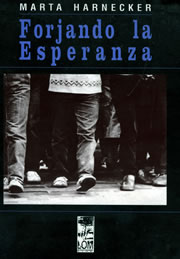 |
|
FORGING THE HOPE |
| |
|
| |
Marta Harnecker, 1995 |
| |
|
| |
The history of Uruguay Frente Amplio and the experience of Montevideo intendancy.
Published in Chile, LOM Ediciones, 1995. |
|
|
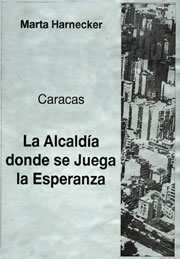 |
|
CARACAS’ MAYORALTY
Where the hope of Venezuelan Causa R is in game |
| |
|
| |
Marta Harnecker, 1995 |
| |
|
| |
Collection: Haciendo camino al andar.
Published in Venezuela, Fundarte, 1995. |
|
|
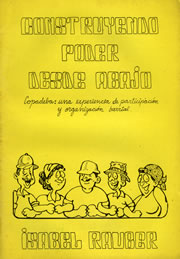 |
|
BUILDING UP POWER FROM BELOW |
| |
|
| |
Isabel Rauber, 1995 |
| |
|
| |
Round tables with neighborhood movement leaders. A experience of neighborhood participation and organization. |
|
|
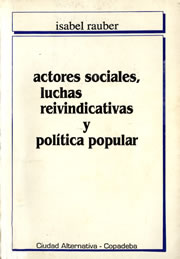 |
|
SOCIAL ACTORS, DEMANDING STRUGGLES AND POPULAR POLICY |
| |
|
| |
Isabel Rauber, 1995 |
| |
|
| |
Critical analysis of the conflict between political praxis and power construction, the way the demanding enters the policy and its relationship with subjects construction starting from popular sectors’ interests and needs. |
|
|
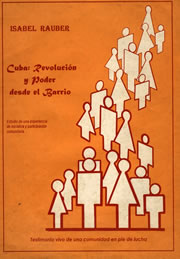 |
|
CUBA: REVOLUTION AND POWER FROM BELOW |
| |
|
| |
Isabel Rauber, 1995 |
| |
|
| |
Study of an experience of initiative and community participation. |
|
|
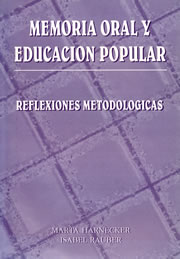 |
|
ORAL MEMORY AND POPULAR EDUCATION
Methodological reflections |
| |
|
| |
Marta Harnecker e Isabel Rauber, 1994 |
| |
|
| |
Interview to Marta Harnecker about the way she works her testimony books; approach for the analysis of a conjuncture by Marta and Isabel Rauber and paper by the latter with the title: “Social sciences and Popular Education: ideas for a knowing dialogue”.
Published in Colombia, CENDAL, 1996. |
|
|
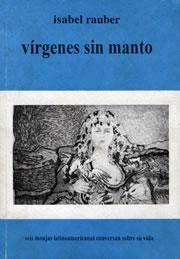 |
|
VIRGINS WITH NO GOWNS |
| |
|
| |
Isabel Rauber, 1994 |
| |
|
| |
Six Latinamerican nuns tell about their lives. |
|
|
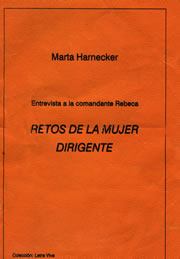 |
|
CHALLENGES OF THE LEADING WOMAN |
| |
|
| |
Marta Harnecker, 1994 |
| |
|
| |
Interview to commander Rebeca from FPL Farabumdo Martí.
Published in Cuba, Ediciones MEPLA, 1994. |
|
|
 |
|
GOVERNING, EVERYBODY’S TASK |
| |
|
| |
Marta Harnecker, 1994 |
| |
|
| |
Study of Caroní mayoralty from Venezuela Causa R.
Published in Cuba, Ediciones MEPLA, 1994; Collection: Haciendo camino al andar; Venezuela, Fundarte, 1995. |
|
|
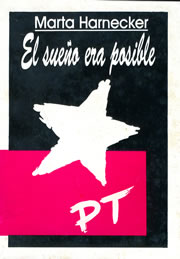 |
|
THE DREAM WAS POSSIBLE |
| |
|
| |
Marta Harnecker, 1994 |
| |
|
| |
The origins of Brazil Workers’ Party (PT), narrated by its main characters.
Published in: Cuba, Editorial Cultura Popular, 1994; Chile, LOM Edicionies, 1st ed., 1994 and 2nd ed., 1995; Brazil, Casa América Livre, 1994. |
|
|
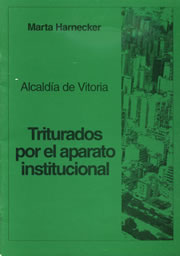 |
|
CRASHED BY THE INSTITUTIONAL APPARATUS |
| |
|
| |
Marta Harnecker, 1993 |
| |
|
| |
Study of the petista mayoralty of Vitoria.
Published in: Cuba, Ediciones MEPLA, 1993; Collection Haciendo camino al andar No. 3, and later in Venezuela, Fundarte, 1995. |
|
|
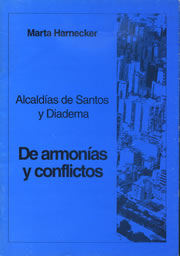 |
|
OF HARMONY AND CONFLICTS |
| |
|
| |
Marta Harnecker, 1993 |
| |
|
| |
Study of petista mayoralties from Santos and Diademas, Brazil.
Published in: Cuba, Ediciones, MEPLA, 1993; Collection Haciendo camino al andar No. 1 and later in Venezuela, Fundarte, 1994. |
|
|
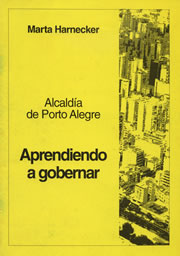 |
|
LEARNING TO GOVERN |
| |
|
| |
Marta Harnecker, 1993 |
| |
|
| |
Study of the petista mayoralty of Porto Alegre, Brazil.
Published in: Cuba, Ediciones MEPLA, 1993; Collection: Haciendo camino al andar No. 2, and later in Venezuela, Fundarte, 1995. |
|
|
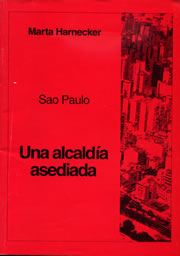 |
|
A HARASSED MAYORALTY |
| |
|
| |
Marta Harnecker, 1993 |
| |
|
| |
Study of the petista mayoralty of Säo Paulo.
Published in: Cuba, Ediciones MEPLA, 1993; Collection: Haciendo camino al andar No. 4, and later in Venezuela, Fundarte, 1995. |
|
|
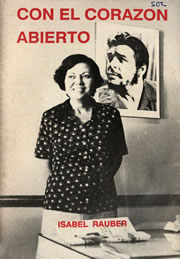 |
|
WITH AN OPEN HEART |
| |
|
| |
Isabel Rauber, 1993 |
| |
|
| |
Interview to Clarita Rodes, a Baptist clergywoman.
The experience of this religious woman since the triumph of the Cuban revolution. |
|
|
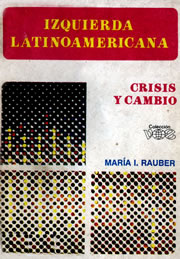 |
|
LATINAMERICAN LEFT, CRISIS AND CHANGES |
| |
|
| |
Isabel Rauber, 1993 |
| |
|
| |
It deals with the origins and dimensions of the crisis of the popular Latinamerican and Caribbean movement and the challenges to overcome it. |
|
|
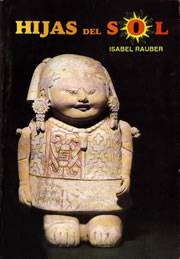 |
|
DAUGHTERS OF THE SUN |
| |
|
| |
Isabel Rauber, 1992 |
| |
|
| |
Interview to four indigenous women, showing their happiness, problems, hope and expectations of their experiences as leaders. |
|
|
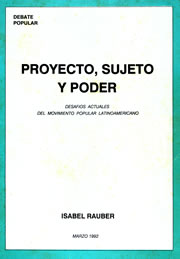 |
|
PROJECT, SUBJECT AND POWER |
| |
|
| |
Isabel Rauber, 1992 |
| |
|
| |
About the challenges of the Latinamerican popular movement in the sixties. |
|
|
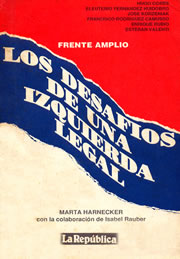 |
|
FRENTE AMPLIO
Challenges of a legal left |
| |
|
| |
Marta Harnecker, 1991 |
| |
|
| |
Collaboration with Isabel Rauber Conversation with leaders of Frente Amplio, form Uruguay, about the history of FA.
Published in: Uruguay, Editorial La República in four volumes, 1991. |
|
|
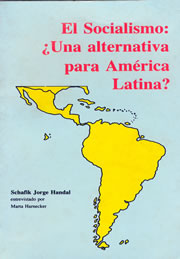 |
|
SOCIALISM
An alternative for Latin American? |
| |
|
| |
Marta Harnecker, 1991 |
| |
|
| |
Interview to Schafik Jorge Handal, Salvadorian Comunist Party Secretary General, (1991).
Published in: Cuba, Collection Biblioteca Popular, January 1991, in El Salvador, Editorial Alterntiva, 1st ed., 1991; Bolivia, Editorial Universidad Nacional Siglo XXI, 1992. |
|
|
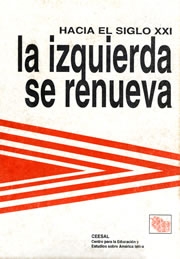 |
|
TOWARDS THE 21ST CENTURY
The Left renews |
| |
|
| |
Marta Harnecker e Isabel Rauber, 1991 |
| |
|
| |
Four essays by Marta Harnecker: Political and social subject of the revolution; Moments in ordering the vanguard; Left mistakes in the sixties and their solutions; and Axis of current debate of the left.
An essay by Isabel Rauber: Crisis and challenges of the left. It also includes an analysis of the conjuncture by both authors and two texts from previous works by Marta Harnecker: Christians and the revolution and The cultural-ethnic matter in Latin America.
Published in Quito, Ecuador, CEESAL, 1991. |
|
|
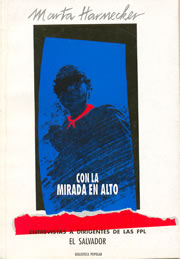 |
|
LOOKING HIGH
History of FPL |
| |
|
| |
Marta Harnecker, 1991 |
| |
|
| |
History of the Liberation Popular Forces Farabundo Martí through interviews with different of its top leaders.
Published in: Chile, Ediciones Popular, 1991. Another edition in El Salvador. |
|
|
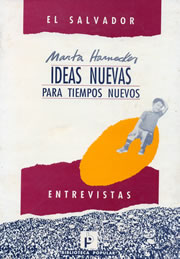 |
|
NEW IDEAS FOR NEW TIMES |
| |
|
| |
Marta Harnecker, 1991 |
| |
|
| |
Interview to the five members of the FMLN General Command: Schafik Jorge Handal, Fermán Cienfuegos, Roberto Roca, Leonel González and Joaquín Villalobos, about the organization, the war stages, the concept of vanguard and the socialist project.
Published in: Chile, Ediciones Biblioteca Popular, 1991. |
|
|
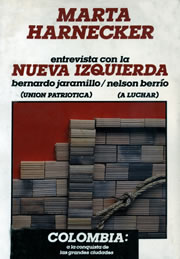 |
|
INTERVIEW WITH THE NEW LEFT |
| |
|
| |
Marta Harnecker, 1989 |
| |
|
| |
Interview to Bernardo Jaramillo from Unión Patriótica and nelson Berríos from A Luchar about the challenges faced by political cadres in a country with guerrilla war.
Published in Cuba, MEPLA, as two separate books and also in Colombia and Argentina with different titles. |
|
| |
|
| |
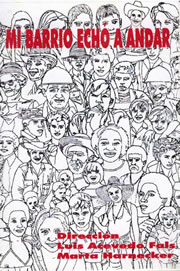 |
|
THE NEIGHBORHOOD IS MARCHING |
| |
|
| |
Directed by: Luis Acevedo Fals and Marta Harnecker
27 minutes, January 1996 |
| |
|
| |
“The Neighborhood is Marching” is the first video made by the Latin American Popular Memory Center for Research (MEPLA) in December of 1995.
This documentary looks at the experience of community work of a group of neighbors in a poor neighborhood in La Lisa, a district of Havana, led by a representative of the Assembly of Poder Popular.
The video summarizes the serious problems that existed when the people arrived to live in the neighborhood: poor housing conditions, garbage and sewage in the streets, unemployment, no recreational facilities, delinquent youth, no services for the elderly or for youth. It explains in detail the methodic and systematic efforts of this group to eliminate apathy and to encourage people to participate in the project. The project’s objectives included the recovery of their own identity and sense of belonging to the neighborhood.
The video also reveals the methods used to resolve the existing social problems. One of the most interesting initiatives of this experience was the creation of a discotheque that made use of the building that housed a local farmers’ market. Besides solving the recreational needs of the youth, the disco became an opportunity to generate income to be reinvested in community projects.
The video recounts the physical transformation of the neighborhood as it also regained its dignity. It also points out how they conducted this work, involving the people by starting with a list of all of the ideas that could be collectively discussed later. |
|
|
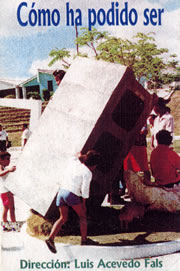 |
|
HOW DID IT HAPPEN? |
| |
|
| |
Directed by: Luis Acevedo Fals
Screenplay: Luis Acevedo Fals and Marta Harnecker
27 minutes, April 1996 |
| |
|
| |
This video depicts a community experience in a two-block area with the worst living conditions in Condado, a neighborhood located in the periphery of the municipality of Santa Clara in the Province of Villa Clara.
It points out how the community physically and spiritually transformed itself starting with a social microbrigade – a group that does construction in the neighborhood with people from the neighborhood – and the action of a group of community workers or “neighborhood parliament” that involves all the formal and natural leaders of the community. Amongst them, the work of the family doctor, the spiritual healer, the police, the cultural activist, and the school principal stands outs. The role of the children in the transformative work of the neighborhood is particularly noteworthy.
The different steps followed in the process of the community work appears in detail in the video.
More in depth information about this experience appears in the book by Marta Harnecker, Construyendo casas y transformando al hombre, published by MEPLA. |
|
|
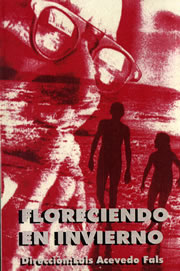 |
|
BLOSSOMING IN THE WINTER |
| |
|
| |
Directed by: Luis Acevedo Fals
Screenplay: Luis Acevedo Fals and Marta Harnecker
26 minutes, May 1996 |
| |
|
| |
This documentary shows the multiple activities (cultural, handicrafts, etc.) of the association of seniors “5 de septiembre,” located in the coastal neighborhood of Santa Fe in the outskirts of Havana.
The video shows images of people with lots of youthful energy, people who, in the winter of their lives and overcoming the trauma of retirement, have begun to fulfill themselves – in many cases, as they had never been able to do before.
More detailed information can be found in the book by Marta Harnecker, "Floreciendo en invierno", published by MEPLA. |
|
|
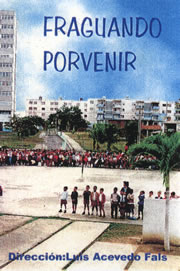 |
|
FORGING THE FUTURE |
| |
|
| |
Directed by: Luis Acevedo Fals
Screenplay: Luis Acevedo Fals and Marta Harnecker
27 minutws, January 1997 |
| |
|
| |
In this material, you will find the history of the transformation of the district of Hermanos Cruz in the municipality of Pinar del Río - a settlement with little sense of roots or belonging. Indeed, two of every three inhabitants wanted to move away.
Several years later, the situation is radically different. Some of the material problems that strongly affected the inhabitants have been resolved. But, above all, the neighborhood came back to life, with multiple recreational, cultural and sports activities. Already, the inertia and the apathy have started to disappear. Children, youth, adults, and seniors feel increasingly more involved in the life of their community. There are still unhappy people that wish to move away but there are half as many as before and they are found within the older population.
Such a radical transformation is due to the methodic and systematic work - but also work full of passion and dedication - of a group of educators that threw themselves into the work of education within the community. They were guided by five principles: not to work blindly but to conduct a community needs assessment, to maximize the community’s potential for leadership and activism, to seek the integration and cooperation of everyone in jointly carrying out the tasks, to bring out the best in everyone while respecting differences, and to publicly recognize those who make a greater effort.
More information about this can be found in the book by Marta Harnecker, "Fraguando el Porvenir” published by MEPLA. |
|
|
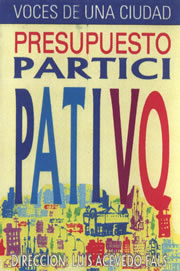 |
|
VOICES OF A CITY
The Participatory Budget of Porto Alegre |
| |
|
| |
Directed by: Luis Acevedo Fals
27 minutes, 1997 |
| |
|
| |
This documentary demonstrates an alternative political practice of the Left in a time of great political deception and how this practice transforms the people.
The experience of democratic participation that is shown here arose in Porto Alegre, Brazil, when the Workers’ Party (PT) assumed the municipal government in 1989. It is referring to the participatory budget. Through a series of meetings and other mechanisms in the neighborhood, the people and not the technocrats sitting behind a desk are the ones who decide what work must be done with the municipality’s available resources.
Angélica, the leader of a group of neighbors that demanded regularization of their land, is the focus of the documentary. In the participatory budget, she finds a space to be listened to and to formulate the demands of her neighbors.
This documentary explains each step in this process of popular participation that requires complete transparency from the municipal government, who informs the population about the available resources, their allocation, and then submits the work to the people for review.
The participatory budget is not a magic wand that solves everything. However, it profoundly transforms the people who participate in the process. They stop feeling that they are asking for handouts but instead they feel that they are owners of their city.. |
|
|
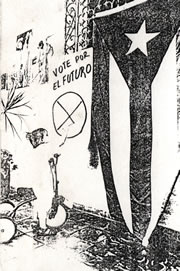 |
|
PREPARATION AND OBJECTIVES OF THE RENDERING OF ACCOUNTS TO THE CONSTITUENCY
About the Assembly of Poder Popular in Cuba |
| |
|
| |
Directed by: Marta Harnecker
38 minutes, 1998 |
| |
|
| |
This video offers a series of suggestions to the representatives in the Poder Popular in Cuba to better prepare the assemblies of the rendering of accounts. It also sets outs the objectives that they should seek to materialize in such meetings:
• to offer updated information that is of real interest
• to explain the results of their term in office and their work as a representative
• to develop an exchange with the electorate to identify problems, propose solutions and analyze the potential participation of the neighbors
• to encourage those who stand out due to their work in the community.
The video insists that this is not a recipe but objectives that the representative ought to follow using their own style, taking into account that each constituency, each area and each representative are different.
. |
|
|
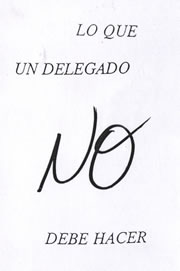 |
|
WHAT A REPRESENTATIVE SHOULD NOT DO
Ideas for Conducting a Meeting Well |
| |
|
| |
Directed by: Marta Harnecker
12 minutes, 1999 |
| |
|
| |
In contrast to the previous video, this video presents a list of things the representatives should not do during the meeting of the rendering of accounts.
• react negatively or in an authoritarian manner
• allow the agenda to take precedence over participation
• ask questions without leaving time for people to prepare their thoughts
• dismiss the ideas formulated by the electorate
• forget that each area is different
• reject opinions by arguing that they should be brought forward to the office
• create the impression that solutions are easy when they are not
• make people feel pressured by time. |
|
|
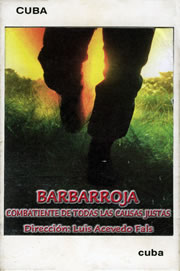 |
|
REDBEARD – WARRIOR OF ALL JUST CAUSES |
| |
|
| |
Directed by: Luis Acevedo Fals
27 minutes, 1999 |
| |
|
| |
With great accomplishment, this documentary depicts the human profile of Manuel Piñeiro Losada, who, when very young, joined the fighters for equality and human rights. The video focuses on the thoughts of his daughter, Camila, while looking at pictures of her father and those of his wife, Marta Harnecker. In this way, little by little the personality of Manuel Piñeiro, Comandante Bararroja, reveals itself. Behind each photograph, always appears an anecdote or a little story, or naturally unlocks a question about the life of this legendary “warrior of all just causes.”
Different Piñeiros are combined in the documentary: the funny and mischevious with the commander that worked with Fidel; the vice minister of the Ministry of the Interior and the head of the Department of America with the tender father and the humble friend; the husband with the capacity of devoting his life to the Revolution and at the same time to love intensely; the Piñeiro that oversaw the preparation of the missions of Che in the Congo and in Bolivia, the internationalist that supported the struggle for liberation of the Latin American peoples with “the bearded uncle” that played with children. All of these Piñeiros are fused in one: the human Piñeiro, the one of bone and flesh, the same one that energetically erupts with his boots of light. |
|
|
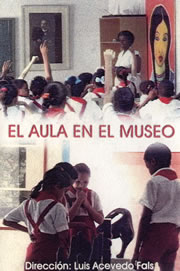 |
|
THE CLASSROOM IN THE MUSEUM
A New Educational Experience |
| |
|
| |
Directed by: Luis Acevedo Fals
20 minutes, 2000 |
| |
|
| |
This material shows how, starting with the renovation of the Plaza Vieja in the historic downtown in the city of Havana, an original educational experience emerged: the classroom-museum.
The construction process could not be halted and neither could classes, but the dust and the noise made the children aggressive and the teachers could not be heard. Eusebio Leal looked for a space in the museum for the children to attend classes while the renovation of the plaza took place.
In the museum, the children not only received classes but their interest in everything surrounding them was stimulated. The reaction was so positive that the idea was born to seek a permanent space inside every museum to deliver classes to all the neighborhood children. The children spend two months of their school year in that environment, alternating teaching with many other activities that promote more holistic development
. |
|
|
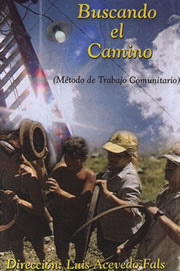 |
|
IN SEARCH OF THE WAY
A Method for Community Work |
| |
|
| |
Directed by: Luis Acevedo Fals
26 minutes, 2000 |
| |
|
| |
This documentary takes place in Guadalupe, a rural community of humble people with a tradition of struggle and solidarity, but who had many social problems: alcoholism, tobaccoism, teenage pregnancy, etc. For 21 years, this community has had an exceptional leader - the president of the popular council who, by example and dedication, has won the admiration and respect of everyone. Nonetheless, it is only in one moment in its history that the community gives a qualitative leap in initiative and popular participation. This happened after they used the methods proposed by the Cuban network of Ciudades para la Salud and in spite of the serious material shortages facing Cuba during those years.
What new elements did this experience contribute to the paths already travelled by the Poder Popular? How did it maximize the many natural qualities of this leader as well as those of the community? You can find the answers to these questions in this documentary and in the book by Marta Harnecker on the same topic. |
|
|
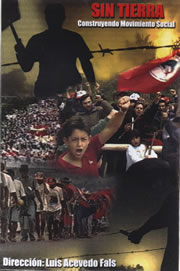 |
|
LANDLESS PEASANTS BUILDING A SOCIAL MOVEMENT |
| |
|
| |
Directed by: Luis Acevedo Fals
45 minutos, 2002 |
| |
|
| |
This documentary film covers the experiences of the Movement of Landless Rural Workers of Brazil, one of the most advanced social movements in Latin America, whose struggle to conquer land is successful in a country where idle land abounds.
Through beautiful and eloquent images, the director shows us how this peasant movement is able to attain its objectives by occupying these lands, thus putting pressure on the government for it to assign them to the peasants willing to work them.
These images reproduce life in camps – provisional setups where the peasants and their families are installed until they are assigned the land – and in settlements – small rural communities where they attempt to build on a small scale the kind of humanist and solidary society they are fighting for.
The film outlines their organization in groups of families, the way they assume agricultural work, and the rest of their activities: schools, cooperatives and recreation centers.
It includes the long marches they organize to overcome the news blackout and communicate with other popular sectors.
We find here the strength and the mystique of a movement that opposes the neoliberal model and conquers land through organization and struggle. |
|
|
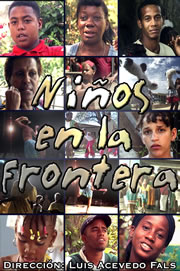 |
|
CHILDREN ON THE FRONTIER
Community experience. Social rescue through music and dance |
| |
|
| |
Directed by: Luis Acevedo Fals
35 minutes, 2002 |
| |
|
| |
This documentary explores the transformation of children and adolescents with negative behavior in “Barrio Nuevo”, a marginal neighborhood located at the limits of Playa and La lisa, two municipalities of Havna City. It shows how the grassroot tradition of music from a box, santería and dance goes from generation to generation and is transmitted to children nowadays.
Marina, a natural leader, who was born in the neighborhood, and Dalia, representative of Poder Popular, wisely used the strong current of habits, customs, musical and dance culture alive in the area, to organise a “children comparsa” and a folklore dance group and had the children transformed street fights, alcoholism, and some other bad habits into culture, studies, visits to historical places, providing them with new options and awaking in them the will to make their dreams come true. |
|
|
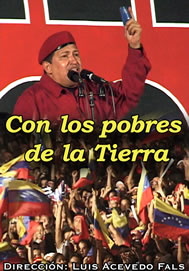 |
|
WITH THE POOR OF THE WORLD
Development of the Boilivarian Revolution |
| |
|
| |
Directed by: Luis Acevedo Fals
57 minutes, 2003 |
| |
|
| |
Through different testimonies this material traces from the genesis of the Bolivarian process to the transformations carried out nowadays (october 2003).
This documentary shows:
1. The strategy of the Bolivarian Revolution to proceed with a transformation process using the peaceful road way.
2. The birth of a new constitutioin changing the rules of the political game and how the people and the military use it to transform the country.
3. The face off between a powerful oligarchy, which refuses to adopt the new rules of the game and an overflowing river of poor hanging on to their contitution and their president who fight to carry out a just transformation process.
4. It outlines the role of the opposition press in leading the counter revolution and the struggle to take control over the oil industry.
It also includes reflections made by President Hugo Chávez about the bolivarian process, his love for children and his conviction to fight for the poor. |
|
|
 MEPLA is a research centre based in Cuba.
MEPLA is a research centre based in Cuba.





















































